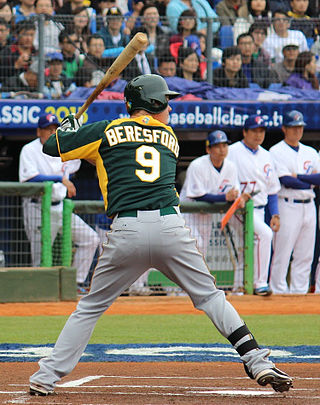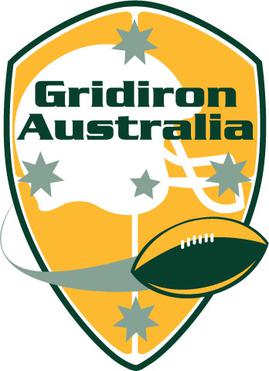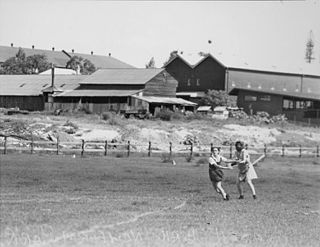
The Australasian Meat Industry Employees Union is an Australian trade union representing workers in the meat industry including in abattoirs, butchers, and smallgoods manufacturers.
CPSU, the Community and Public Sector Union is a national trade union in Australia. The union came was established on 1 July 1994 with the amalgamation of the Public Sector, Professional, Scientific, Research, Technical, Communication, Aviation and Broadcasting Union (PSU) with the State Public Service Federation (SPSF). The CPSU currently has around 41,000 members.

In Australia, baseball is a game that is played in all states and territories of the country.

Representative matches in Australian rules football are matches between representative teams played under the Australian rules, most notably of the colonies and later Australian states and territories that have been held since 1879. For most of the 20th century, the absence of a national club competition in Australia and international matches meant that intercolonial and later interstate matches were regarded with great importance.

Australia's softball history began in 1939 when Gordon Young, Director of Physical Education in NSW, began to promote the game in schools and colleges. In 1942, during World War II, US army sergeant William Duvernet organised softball as a recreation for US nurses stationed in Victoria. Another American, Mack Gilley, introduced the game to Queensland in 1946. Australia's first inter-state championship was played in Brisbane in 1947 and was won by Victoria. The second national championship was held in Melbourne two years later. It was at this championship that the Australian Softball Federation was formed with Queensland, Victoria, South Australia and New South Wales being the founding members. The other States of Australia have since joined. Eight Australian Championships are now conducted each year – Women's, Men's, Under 23 Women and Men, Under 19 Women and Men, and Under 16 Girls and Boys. Softball has been a major sport in the schools program for some time now and it is estimated that more than 250,000 children play the game each year.
Futsal in Australia is governed by the Football Federation Australia and its state based futsal associations. Australia has played in seven FIFA Futsal World Cups.
Softball in Australia is played in Australia.

Gridiron Australia is the governing body of American football in Australia. It is an approved sporting association under federal government regulations and is a member of the International Federation of American Football (IFAF). The organisation was formed in 1996.
The AFL National Championships is an annual Australian national underage representative Australian rules football tournament. It is seen as one of the main pathways towards being drafted into a team in the fully professional Australian Football League (AFL).

In the 1880s in Victoria, there were school competitions for girls involving interschool competitions for rounders, an early form of baseball. The competitions were abandoned in the 1890s. Girls who played rounders/baseball during the 1880s and 1890s were required to wear long sleeved shirts and long skirts. These restricted a player's ability to move.
The organisation of sport in Australia has been largely determined by its Federal system of government – Australian Government and six states and two territories governments and local governments. All three levels play an important role in terms of funding, policies and facilities. Each major sport is managed by a national sports organisation, with state counterparts that manage community sporting clubs. Umbrella or peak organisations represent the interests of sports organisations or particular sport issues. Education sector plays a small role through universities and schools. Private sector's involvement is extensive in professional sport through facilities, club ownership and finance/sponsorship.

Bowls Australia is the governing body for the sport of bowls in Australia. Bowls Australia is responsible for the leadership, development and management of lawn bowls in Australia. It is a not-for-profit organisation governed by a voluntary board that provides the strategic direction for the sport and the strategies that are implemented by the staff at the national office.

Quidditch, also known as Quadball, in Australia is played by a mixture of university and community teams. Due to the geographic demographics of the country, most major competitive tournaments are held in the eastern states. There are currently over 30 registered teams in the country.
The 2015 FFA Cup preliminary rounds were a qualifying competition to decide 21 of the 32 teams which will take part in the 2015 FFA Cup Round of 32, along with the 10 A-League clubs and reigning National Premier Leagues champion. The preliminary rounds operated within a consistent national structure whereby club entry into the competition was staggered in each state/territory, with the winning clubs from Round 7 of the preliminary rounds in each member federation gaining direct entry into the Round of 32. All Australian clubs were eligible to enter the qualifying process through their respective FFA member federation, however only one team per club was permitted entry in the competition. Teams from the Northern Territory competed in this competition for the first time.
The 2016 FFA Cup preliminary rounds were the qualifying competition to decide 21 of the 32 teams which took part in the 2016 FFA Cup Round of 32, along with the 10 A-League clubs and reigning National Premier Leagues champion. The preliminary rounds operated within a consistent national structure whereby club entry into the competition was staggered in each state/territory, with the winning clubs from Round 7 of the preliminary rounds in each member federation gaining entry into the Round of 32. All Australian clubs were eligible to enter the qualifying process through their respective FFA member federation, however only one team per club was permitted entry in the competition.
The 2017 FFA Cup preliminary rounds was the qualifying competition to decide 21 of the 32 teams which took part in the 2017 FFA Cup Round of 32, along with the 10 A-League clubs and reigning National Premier Leagues champion. The preliminary rounds operated within a consistent national structure whereby club entry into the competition is staggered in each federation, with the winning clubs from Round 7 of the preliminary rounds in each member federation gaining entry into the Round of 32. All Australian clubs were eligible to enter the qualifying process through their respective FFA member federation, however only one team per club was permitted entry in the competition.
The 2018 FFA Cup preliminary rounds was the qualifying competition to decide 21 of the 32 teams which took part in the 2018 FFA Cup Round of 32, along with the 10 A-League clubs and reigning National Premier Leagues champion, Heidelberg United. The preliminary rounds operated within a consistent national structure whereby club entry into the competition was staggered in each federation, with the winning clubs from Round 7 of the preliminary rounds in each member federation gaining entry into the Round of 32. All Australian clubs were eligible to enter the qualifying process through their respective FFA member federation, however only one team per club is permitted entry in the competition.
The National Premier Leagues Women's (NPLW) are regional association football competitions in some states and territories in Australia, which act as the second tier of the sport in the country below the A-League Women. The WNPL consists of the highest level state league in a subset of the state-based federations within Australia, and is overseen by Football Australia (FA) in partnership with participating member federations.
The 2021 FFA Cup preliminary rounds were the qualifying competition to decide 23 of the 32 teams to take part in the 2021 FFA Cup. The competition commenced in February and was completed in November.
The 2022 Australia Cup preliminary rounds were the qualifying competition to decide 24 of the 32 teams to take part in the 2022 Australia Cup. The competition commenced in February and was completed in October.







